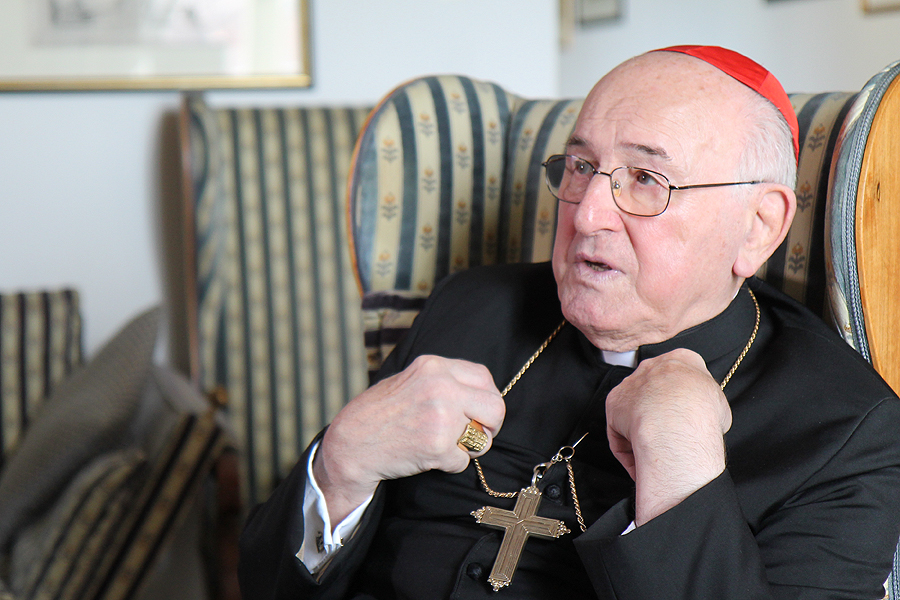In the wake of Cardinal Gerhard Müller’s recent strong rebuttal of the German bishops’ decision to admit Protestant spouses of Catholics, in individual cases, to Holy Communion, it is now Cardinal Walter Brandmüller who takes his own stance with regard to this new episcopal step, calling the German bishops’ referral to “individual cases” a “salami tactic” and a “wholly dishonest ploy.” The cardinal also speaks of the danger of “taking rules for situations of existential emergency and applying them to normal life,” and he calls such an approach a “wicked trick.”
Armin Schwibach, Rome Correspondent for the Austrian news website Kath.net, published today, on 6 March, an article about the theologically doubtful approach of the German bishops to the question of intercommunion. In his report, he relates comments made by Cardinal Walter Brandmüller – the former President of the Pontifical Committee for Historical Sciences – in a recent interview with him. The German cardinal, once more, finds some strong words about the doings of the German Bishops’ Conference, thus helping Catholics to see clearly their methods and the insufficient theological foundation of their new initiative. His comments might also be of help in the context of the larger discussions in the Church ever since Pope Francis, in 2015, had opened up himself permissively with regard to individual Protestant spouses receiving Holy Communion.
Cardinal Brandmüller first states that it is important to discern what is meant when we speak about the “Church.” Is this “a company to help make better the world? An NGO for aiding people in life?” Answering these questions himself, he says that “the ‘Church’ is a reality” which does not think in these terms. “The Church is a work of God, she is the visible, experienced form in which the Risen Christ continues His salvific work in the world.” After defining the word “Church,” the German cardinal also defines the word “last supper” or “communion”: some might think of a meal, of hospitality and more. However, “Eucharist, Communion in the Catholic and Orthodox sense means something completely different.” Here Cardinal Brandmüller reminds us of the transsubstantiation of bread and wine into Body and Blood of Christ. It is about “the truly present Christ in the visible form of bread and wine,” he explains.
Thus, Holy Communion in this sense means “that the redeemed man unites himself with Christ present in this mystery.” Because of this, says Brandmüller, is it important to keep in mind the warning of St. Paul not to eat and drink the body and blood of Christ to one’s own damnation. “This needs to be kept in mind when speaking about [a laxer] case-to-case admittance to Communion.”
Cardinal Brandmüller then makes it very clear what he thinks of the German bishops’ new document explaining their new approach to Communion for Protestant spouses: “If now the document of the German bishops speaks about individual cases in which this may be possible, then this is in and of itself only a tactical step toward general intercommunion with non-Catholics.” [emphasis added] The German cardinal adds, “one also calls such an approach ‘salami tactics.’ And: constant dripping wears down the stone. It is a wholly dishonest ploy, in order to get to the true goal.”
Cardinal Brandmüller also rejects the German bishops’ claim that those Protestant spouses should be given access to Holy Communion because of their “Eucharistic hunger.” He calls this expression “a case that is construed with quite some effort,” and it is “an embarrassing melodramatic set up,” yes, simply “sob-stuff.” He comments, saying that “a Christian who truly yearns for Holy Communion and who knows that there is no Eucharist without the Church and no Church without the Eucharist, will ask for admittance into the Catholic Church. Anything else would be doubtful and dishonest.” The Church, he adds, is not a “self-service shop” where one may pick and chose according to one’s own desires. “Here, it is about everything or nothing!” exclaims the cardinal.
Cardinal Brandmüller also discusses the German bishops’ reference to Code of Canon Law 844 § 3 and 4 which speak about emergency situations, in which an Orthodox Catholic (§ 3) or a Christian from other denominations (§ 4) may have recourse to the Church’s Sacraments when there is an imminent danger of death or a situation of imprisonment, and only in the case that that the individual Christian “is disposed in the right way,” which means “to be free from mortal sin and to have the honest desire to receive the Sacrament,” according to the cardinal. He also repeats his question as to why such a person “who fulfills those conditions, and who is not in an emergency situation, should not simply ask to be admitted to the Church.”


